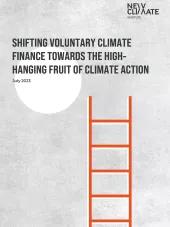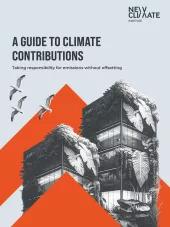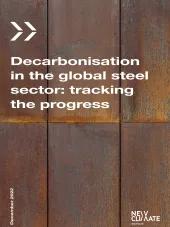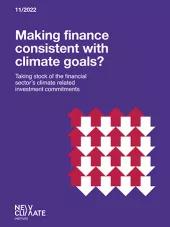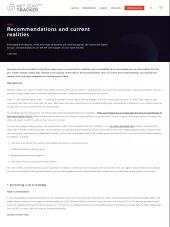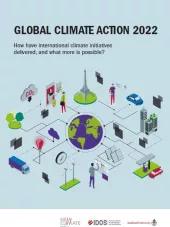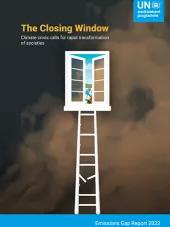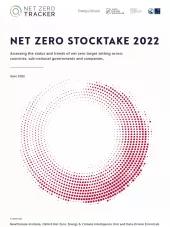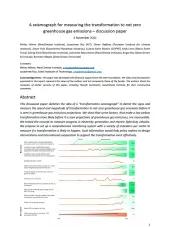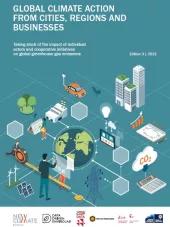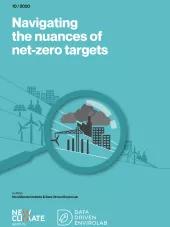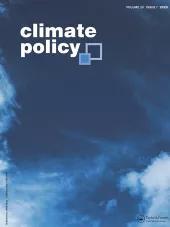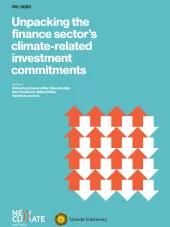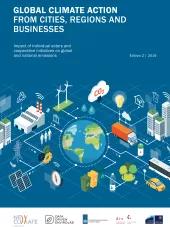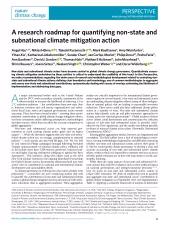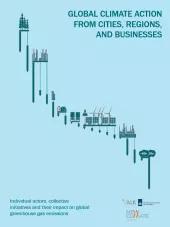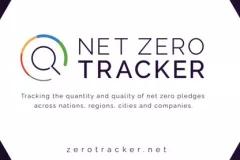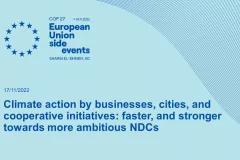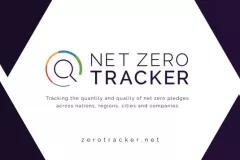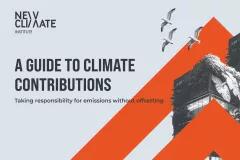Page navigation
About the project The consortium Relevant publications
About the project

CAMDA is a community of data and analytical experts, dedicated to providing credible climate action information from regions, cities, businesses, investors and civil society. It was initiated in 2017 by a call from Patricia Espinosa, Executive Secretary UN Climate Change, and Christiana Figueres, former Executive Secretary UN Climate Change, for a collaborative network of professionals and organizations to assess and communicate the impact of climate action and to record and track ambition and progress made by these actors in the context of the Paris Agreement. The research consortium led by NewClimate Institute has comprised an integral part of the CAMDA Climate Action Tracking Initiative.
Since 2018, the consortium has released a series of “global aggregation” reports at key climate summits and policy fora.
For example, the consortium released its 2019 Global Aggregation Update Report at the UN Secretary-General’s Climate Summit in September 2019. The report showed that sub/non-state climate action could play a crucial role in limiting global warming to 2°C or lower, if these actions were fully implemented. The report also made significant direct knowledge contributions to the United Nations Framework Convention on Climate Change (UNFCCC) process and became the basis for Clause 29 in the COP25 decision, which requested the UNFCCC secretariat to “continue engaging with non-Party stakeholders and enhancing the effectiveness of the Non-State Actor Zone for Climate Action platform, including the tracking of voluntary action”.
The ongoing project phase (2021-2027) funded by IKEA Foundation (grant no. 2010-01689) aims to further advance the understanding of the universe of global subnational and non-state climate action, the potential impact of these actors on global greenhouse gas (GHG) emissions and their actual progress. This project consortium is one of the few in the world that regularly updates the global overview and assessment of climate actions by cities, regions and businesses.
Topic-wise this project will also address some of the main knowledge gaps identified in previous work:
1) Aggregation of emission reduction targets: A wealth of cities regions and businesses set themselves climate targets. We analyse if these targets in aggregate (globally and for selected countries) add ambition over what national governments are doing and planning. The ‘ambition loop’ between actors can work only if there are some cities, regions and businesses that aim for higher ambition than the national governments.
2) Tracking implementation: Targets and goals without effort to implement them are a pie in the sky. It is of utmost importance to assess measures implemented by sub/non-state actors towards their self-set targets as well as the long-term temperature limit of the Paris Agreement. We will assess the stringency of the implemented measures and whether the implemented measures are the most needed or appropriate ones.
3) Supply chain emission targets and net zero emission targets: Both are essential to limit warming below 1.5°C. It is encouraging that they have become increasingly popular among sub/non-state actors in the past years, but they can result in “greenwashing” and even lead to increased emissions if not set right. It is necessary that these emerging targets are scrutinised, so that they are set up in a way that leads to 1.5 °C-consistent emissions reductions. In this project, we conduct in-depth analyses of the climate action plans in hard-to-abate industries and sectors with significant value chain emissions.
4) Financial institutions’ climate action: Institutional investors and asset managers are such powerful non-state actors that infrastructural transformation necessary for the 1.5°C goal cannot be realised without their actions. The number of climate targets among them are rapidly increasing, but there is limited understanding on how their actions could lead to GHG emissions reductions on the ground. Without analysing the real-world impact of these targets, we cannot say if the financial sector has embarked on the transition or if it needs to be further incentivised to do so.
Consortium
NewClimate Institute
- Members: Frederic Hans, Niklas Höhne, Aki Kachi, Takeshi Kuramochi, Anna Nilsson, Natalie Pelekh, Sybrig Smit, Maria Jose de Villafranca Casas
Data-Driven EnviroLab, University of North Carolina - Chapel Hill
- Members: Katherine Burley, Angel Hsu, Kaihui Song, Zhi Yi Yeo
Copernicus Institute of Sustainable Development, Utrecht University
- Members: Chelsea Jones, Mark Roelfsema
German Institute of Development and Sustainability (IDOS)
- Members: Andrew Deneault
Radboud University Nijmegen
- Members: Sander Chan
Blavatnik School of Government, University of Oxford (BSG)
- Members: Thomas Hale
Relevant publications and other outputs
Policy reports
- Global status assessment reports (2018, 2019, 2021, 2022: cooperative initiatives and individual non-state actors, 2023)
- Doubling Down on Climate Action: Cities and Regions Must Put in 2x the Work to Stay on Track with Climate Goals (2023)
- Shifting voluntary climate finance to the high hanging fruit of climate action (2023)
- A guide to climate contributions: Taking responsibility for emissions without offsetting (2023)
- From Rhetoric to Reality: Investigating Financial Institutions' Net Zero Portfolio Commitments (2023)
- Landscape of finance sector’s climate commitments (2020, 2022)
- Net Zero Tracker: annual Stocktake reports (2022, 2023)
- Decarbonisation in the global steel sector: Tracking the progress (2022)
- UNEP Emissions Gap Report 2022 (Chapter 5 on sectoral transformation in electricity supply, industry, buildings and transportation)
- Discussion paper: A seismograph for measuring the transformation to net-zero greenhouse gas emissions (2021)
- Navigating the nuances of net-zero targets (2020)
Peer-reviewed journal articles
- Roelfsema et al. (2024) Comparing the ambition of EU companies with science-based targets to EU regulation-imposed reductions (forthcoming, npj Climate Action)
- Kuramochi et al. (2024) Supporting the Paris Agreement through international cooperation: potential contributions, institutional robustness, and progress of Glasgow climate initiatives
- de Villafranca Casas et al. (2024) Climate targets by major steel companies: An assessment of collective ambition and planned emission reduction measures
- Hsu et al. (2023) From drumbeating to marching: Assessing non-state and subnational climate action using data
- Burley Farr et al. (2023) Cities and regions tackle climate change mitigation but often focus on less effective solutions
- Damkaer Hansen et al. (2022) The status of corporate greenhouse gas emissions reporting in the food sector: An evaluation of food and beverage manufacturers
- Lui et al. (2021) Correcting course: the emission reduction potential of international cooperative initiatives
- Hale et al. (2021) Sub- and non-state climate action: a framework to assess progress, implementation and impact
- Kuramochi et al. (2020) Beyond national climate action: the impact of region, city, and business commitments on global greenhouse gas emissions
- Hsu et al. (2020) Beyond states: Harnessing sub-national actors for the deep decarbonisation of cities, regions, and businesses
- Hsu et al. (2019) A research roadmap for quantifying non-state and subnational climate mitigation action
Theses
- Joel Beuerle (2023) Assessing the quality and scope of corporate target setting in 2021 by food and beverage companies. MSc thesis, Utrecht University.
- Jelle Smeets (2022) Greenhouse gas emission coverage and reduction potentials of scope 3 emissions in car manufacturing. MSc thesis, Utrecht University.
- Mark Roelfsema (2022) Capturing climate actions in long-term scenarios: Integrated assessment modelling of state policies and non-state actions implemented to limit global temperature increase to 2 or 1.5 degrees Celsius PhD thesis, Utrecht University.
- Sybrig Smit (2019) Addressing Overlaps in Non-State and Subnational Climate Action Aggregation Analyses: Bridging the gap, or counting chickens before they hatch? MSc thesis, Utrecht University.
Databases
Blogs, Events & Webinars
- COP28 official side event (December 2023) Ratcheting integrity of net zero commitments to unlock ambition loops and regain climate momentum
- Report launch webinar (September 2023): Global Climate Ambition of Cities, Regions and Companies 2023
- COP27 official side event (November 2022): Balancing net zero integrity and momentum
- COP27 EU Pavilion side event (November 2022): Tracking progress of national and industry sector actions towards global net zero emissions
- COP27 EU Pavilion side event (November 2022): Climate action by businesses, cities, and cooperative initiatives: faster, and stronger towards more ambitious NDCs
- Roelfsema, Mapes, and Höhne. (2021) - The ambition loop in motion for electric vehicles in the automotive industry




